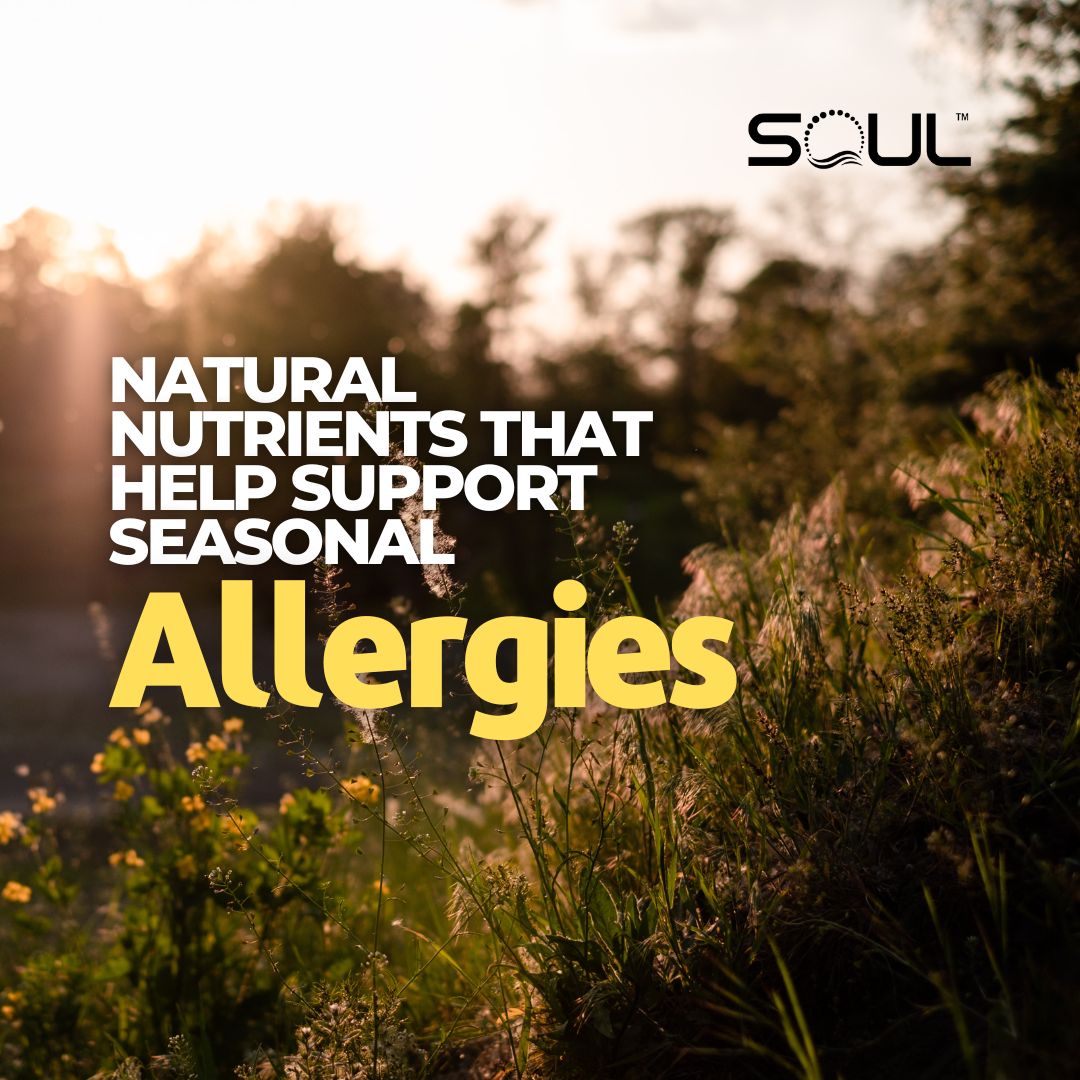
Natural Nutrients to Support Seasonal Allergies: Unleashing the Power of Nature
Let’s face it: seasonal allergies are a war against an invisible enemy. As the trees bloom and the flowers flourish, so does the onslaught of sneezing, itching, and congestion. For those of us caught in this annual crossfire, traditional allergy meds often come with a mixed bag of side effects—drowsiness, foggy heads, and a lethargy that could slow down a marathoner. But what if nature held the keys to easing this perennial struggle?
Below are seven potent nutrients that can help you weather allergy season, without losing your edge.
Quercetin: Nature’s Anti-Allergy Warrior
Quercetin, a powerful flavonoid found in foods like onions, apples, and green tea, is more than just a nutritional afterthought. Think of it as a biological bouncer, quelling inflammation and blocking histamines—the body’s alarm bells that trigger symptoms. Mechanistically, quercetin stabilizes mast cells (the culprits releasing histamines) like a seasoned sergeant calming his troops, preventing unnecessary chaos in the immune system.
Pro Tip: Add onions to your omelets, sip green tea in the afternoons, and grab a handful of berries for a mid-day snack. You’re not just indulging; you’re building a defensive wall.
Vitamin C: The Immune Boosting Dynamo
Vitamin C is the all-star of immunity, famous for its cold-busting prowess. Yet, it’s also a natural antihistamine, taming the histamine surge that fuels allergy symptoms. This isn’t just guesswork—research shows that high levels of Vitamin C can lower histamine levels in the blood, offering a natural reprieve from the stuffiness and sneezes.
The Twist: A squeeze of lemon in your morning water isn’t just a trendy habit—it’s your first line of defense. Eat the rainbow, too, with bell peppers, leafy greens, and strawberries for maximum impact.
Omega-3 Fatty Acids: Inflammation’s Kryptonite
Omega-3s, those prized fatty acids found in salmon and chia seeds, don’t just support your heart; they’re frontline fighters against inflammation. Here’s why this matters: seasonal allergies are an inflammatory condition at their core. By incorporating EPA and DHA, two potent omega-3s, you’re essentially issuing an eviction notice to the swelling and redness clogging your sinuses.
Daily Action Plan: Aim for two servings of fatty fish weekly. Think of it as a strategic strike against inflammation.
Probiotics: Balancing the Gut for a Steady Defense
If the immune system is the army, the gut is the command center. An imbalance in gut bacteria has been shown to exacerbate allergic reactions, hinting at a deep connection between your gut and your sinuses. Enter probiotics—these microscopic allies help modulate the immune response, ensuring that your body doesn’t overreact to pollen or dust.
Insider’s Take: Regular servings of fermented foods like kefir, sauerkraut, or kimchi aren’t just trendy; they’re strategic moves to maintain immune harmony.
Bromelain: Pineapple’s Secret Weapon
Bromelain, an enzyme found in pineapples, may sound like the latest buzzword, but this nutrient packs a punch. It’s been shown to help thin mucus, reduce nasal congestion, and ease respiratory symptoms. Mechanistically, it disrupts the formation of inflammatory compounds—think of it as clearing out the traffic jam in your airways.
Your Go-To: A slice of fresh pineapple or a bromelain supplement could be the small change that leads to big relief.
Nettle Leaf: The Age-Old Antihistamine
For centuries, nettle leaf has been used to quell the itching and sneezing associated with allergies. Today, research backs its effectiveness as a natural antihistamine. Nettle leaf contains bioactive compounds that inhibit histamine production at the source, offering a gentler alternative to conventional antihistamines without the sedative side effects.
A Word to the Wise: Enjoy a warm cup of nettle leaf tea in the evening. It’s an ancient remedy with modern benefits.
Butterbur: The Herbal Heavyweight
Butterbur may sound like something from a fantasy novel, but it’s a legitimate contender in the battle against allergies. Studies show that its active compounds help reduce nasal congestion and inflammation. However, caution is key—raw butterbur contains pyrrolizidine alkaloids (PAs) which can be toxic. Always choose PA-free supplements and consult a healthcare professional before diving in.
Final Thought: Think of butterbur as an ace up your sleeve—powerful but to be used with precision.
The Bottom Line: A Balanced, Comprehensive Approach
Nature offers a bounty of nutrients that can help you navigate the allergy season. Incorporating foods and supplements rich in quercetin, vitamin C, omega-3s, probiotics, bromelain, nettle leaf, and butterbur can strengthen your immune defenses and reduce symptoms. But remember: no nutrient works in isolation. Adopt a comprehensive strategy that includes a balanced diet, regular exercise, and avoiding known triggers.
At the end of the day, allergies are like any other battle—it’s about preparation, vigilance, and choosing the right allies. Let nature’s nutrients be your tactical advantage this allergy season.
These statements have not been evaluated by the Food and Drug Administration. This product is not intended to diagnose, treat, cure or prevent any disease. This article is for informational purposes only and is not a substitute for professional medical advice. Always consult your healthcare provider regarding any health concerns or before starting new supplements.
